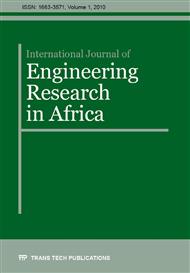[1]
O. Fenollar, D. Garcia, L. Sanchez, J. Lopez, R. Balart, Optimization of the curing conditions of PVC plastisols based on the use of an epoxidized fatty acid ester plasticizer, Eur. Polym. J. doi: 10. 1016/j. eurpolymj. 2009. 05. 029 (2009).
DOI: 10.1016/j.eurpolymj.2009.05.029
Google Scholar
[2]
R. Kalouskova, M. Novotna, Z. Vymazal, Investigation of thermal stabilization of poly (vinyl chloride) by lead stearates and its combination with synthetic hydrotalcite, Polym. Degrad. Stab. 85(2004) 903 - 909.
DOI: 10.1016/j.polymdegradstab.2004.04.008
Google Scholar
[3]
E. Arkis, D. Balköse, Thermal stabilization of poly (vinyl chloride) by organotin compounds, Polym. Degrad. Stab. 88 (2005) 46 - 51.
DOI: 10.1016/j.polymdegradstab.2004.02.021
Google Scholar
[4]
D. Balköse, H.I. Gokcel, S.E. Göktepe, Synergism of Ca/Zn soaps in poly (vinyl chloride) thermal stability, Eur . Polym. J. 37 (2001) 1191 - 1197.
DOI: 10.1016/s0014-3057(00)00233-0
Google Scholar
[5]
S. Atakul, D. Balköse, S. Ulku, Synergistic effect of metal soaps and natural zeolite on poly (vinyl chloride) thermal stability, J. Vinyl Addit. Technol . 11 (2005) 47 - 56.
DOI: 10.1002/vnl.20035
Google Scholar
[6]
W. H. Starnes (Jr. ), B. Du, S. Kim, V. G. Zaikov, X. Ge, E. K. Culyba, Thermal stabilization and plasticization of poly (vinyl chloride) by ester thiols: Update and current status, Thermochimica Acta, 442 (2006) 78 - 80.
DOI: 10.1016/j.tca.2006.01.018
Google Scholar
[7]
M.T. Benaniba, N. Belhaneche-Bensemra, G. Gelbard, Stabilization of PVC by epoxidized sunflower oil in the presence of zinc and calcium stearates, Polym. Degrad. Stab. 82 (2003) 245- 249.
DOI: 10.1016/s0141-3910(03)00178-2
Google Scholar
[8]
M. T. Taghizadeh, F. Fakhimi, Kinetic study of degradation and stabilizing effect of organic thermal stabilizers (EDTA, 1, 2 propane diol, benzoic acid and phenol) for rigid poly (vinyl chloride), Iranian Polym. J. 14 (2005) 685 - 692.
Google Scholar
[9]
G. Sivalingam, G. Madras, Effect of metal oxides/chlorides on the thermal degradation of poly (vinyl chloride), poly (bisphenol a carbonate) and their blends, Ind. Eng. Chem. Res. 43 (2004) 7716 - 7722.
DOI: 10.1021/ie049590q
Google Scholar
[10]
N. A. Mohamed, M. W. Sabaa, A. A. Yassin, Organic thermal stabilizers for rigid poly (vinyl chloride) IV, N-aryl phthalimides, Polym. Degrad. Stab. 76 (2002) 355 - 365.
DOI: 10.1016/s0141-3910(02)00061-7
Google Scholar
[11]
T. O Egbuchunam, D. Balköse, F.E. Okieimen, Preparation and characterization of divalent metal soaps of rubber seed oil, J. Chem. Soc. Niger. 32(1) (2007) 61 - 68.
Google Scholar
[12]
A. Broido, J. Polym. Sci. Part A2, 7 (1969) 1761 - 1773.
Google Scholar
[13]
F.E. Okieimen, O. C. Eromosele, Thermal stabilization of PVC with metal soaps of Khaya seed oil: Thermogravimetric studies, J. Appl. Polym. Sci. 77 (2000) 1432 - 1438.
DOI: 10.1002/1097-4628(20000815)77:7<1432::aid-app4>3.0.co;2-2
Google Scholar
[14]
H. Baltacioglu, D. Balköse, Effect of zinc stearates and/or epoxidized soybean oil on gelation and thermal stability of PVC-DOP plastigels, J. Appl. Polym. Sci. 74 (1999) 2488 - 2498.
DOI: 10.1002/(sici)1097-4628(19991205)74:10<2488::aid-app18>3.0.co;2-b
Google Scholar
[15]
A. Jimenez, V. Berenguer, J. Lopez, J. Vilaplana, New mathematical model on the thermal degradation of Industrial plastisols, J. Appl. Polym. Sci. 60 (1996) 2041 - (2048).
DOI: 10.1002/(sici)1097-4628(19960620)60:12<2041::aid-app1>3.0.co;2-m
Google Scholar
[16]
R. Benavides, M. Edge, N.S. Allen, M. Shah, M.M. Tellez, The mode of action of metal stearate stabilizers in poly (vinyl chloride) III. Influence of pre-heating on polyene formation and secondary reactions, Polym. Degrad. Stab. 48 (1995).
DOI: 10.1016/0141-3910(95)00086-2
Google Scholar


